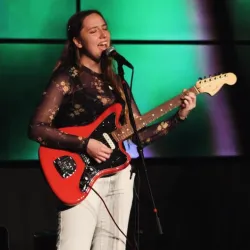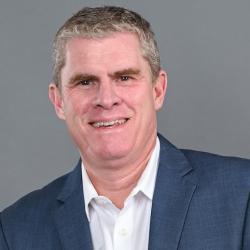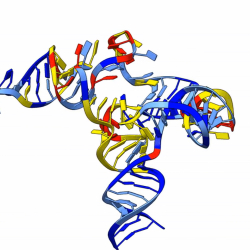Former Competitors Prepare Local High Schoolers for Science Olympiad
UMD’s Maryland Science Olympiad student volunteers created a space for aspiring young scientists to test their STEM skills.

On a cold morning in February 2025, more than 500 local high school students descended on the University of Maryland’s campus, armed with handwritten notes, months of diligent preparation and a shared sense of determination. That day, classrooms usually filled with lecturing professors and college students transformed into makeshift exam halls and testing grounds for handmade prototypes. As the high schoolers gathered in the Chemistry and Physics buildings on campus, they readied themselves to compete in the annual UMD Science Olympiad Invitational—a one-day event organized entirely by a team of UMD student volunteers who once stood in the competitors’ shoes.
“Most, if not all of our members, competed in the past for our respective high schools,” explained Angela Tan, a junior biological sciences major who also serves as co-president of Maryland Science Olympiad (MSO) at UMD. “Our goal with these invitational events is to provide younger students more opportunities to practice for bigger tournaments and give them a competitive edge.”
The Science Olympiad is a nationwide competition involving over 7,800 teams from all 50 states. Students compete in 23 events spanning earth science, biology, chemistry, physics and engineering and advance from regional to state to national competitions. Contestants also get a running start toward college by gaining relevant skills.
Former participants like Tan and other members of MSO at UMD remain passionate about the contest long after their competition is over. MSO’s five board members and about a dozen active volunteers worked for months to organize the massive invitational event for hundreds of local high school students. The team members wrote original exams, coordinated build and design events, secured classrooms, proctored tests, and managed logistics—all while balancing their own coursework at UMD.
Tan says the hard work needed to pull off the annual daylong event is worth it.
“We’re part of something much bigger,” Tan added. “We joined MSO at UMD to give back to the community that gave us key experiences that continue to shape our academic journeys today.”

Beyond the classroom
For its participants, the Science Olympiad competition offers something traditional classrooms rarely can: extraordinary depth in specialized subjects.
Olympiad events range from intensive written exams to hands-on engineering challenges that require months of careful design and testing. In the “Detector Building” event, participants construct special electronic scales that meet precise specifications. Tan recalled competing in the “Anatomy and Physiology” event as a high school student, noting that the content she studied for the contest came in handy later when she began studying neuroscience at UMD.
“[Anatomy and Physiology] focused on different organ systems every year, which really encouraged participants like me to go out of my way to find resources and learn more about the integumentary or endocrine systems, for example,” Tan said. “Many of the competition events tend to cover very specific topics and the content can go very deep into detail. Students get to delve into their interests in a way they can’t while they’re following a standard high school curriculum. The things they learn here might not even get covered until late in college.”
Ty Grant, a sophomore mechanical engineering major and MSO’s event coordinator, credited his high school Science Olympiad experience with shaping his academic trajectory at UMD.
“It was my first real exposure to engineering. It’s a lot more hands-on than what you get in traditional high schools, where you don’t really get opportunities to actually make something yourself,” Grant reflected. “I participated in the [Science Olympiad’s] build events all four years of high school, where I helped build towers, bridges and even things like bottle rocket ping-pong parachutes.”
Competing in the event also helped sophomore computer science major Valentina Hong develop new study strategies and ways to solve complicated problems. Unlike the traditional high school classroom environment where a teacher or textbook guides students through content, Olympiad contestants are encouraged to explore topics on their own to successfully pass the written exams or hands-on building tests. Often, that means scouring the internet, video tutorials and articles for more information.
“You have to follow these vaguely written rules supplied by the competition, which tell you approximately what’s testable, but there are many different directions you can take,” Hong explained. “Learning how to do independent research to find what you need is a skill that’s important for college students and in the real world.”
Maryland Science Olympiad - Electric Vehicle testing
Passing the torch
This year, for the first time, the MSO at UMD secured funding from the Department of Chemistry and Biochemistry and the College of Computer, Mathematical, and Natural Sciences to hold the invitational competition on campus. With that support, the group expanded the program to access resources (from booking classrooms to printing exams) that were not available before.
“We’re in talks to continue that partnership while trying to expand to other departments,” Grant said. “We currently work with Bonnie Dixon, our faculty advisor in Chemistry and Biochemistry, to hold these events, but our next goal is to expand faculty involvement by looping in other units like engineering. The Olympiad draws from so many fields that it makes sense to include people from other departments.”
Plans for next year’s UMD invitational tournament are already underway. This summer, MSO at UMD will brainstorm ways to encourage more participation from UMD students and faculty members, as well as local high schoolers. One thing’s for sure—the team will continue to share their Science Olympiad experiences with the next generation of aspiring scientists, preparing them for the challenges of both the competition and the real world.
“Sometimes, you’re just on your own and you have to teach yourself how to figure things out,” Hong said. “That’s something Science Olympiad taught me, something that’s helped me through college—learning how to learn. We’re trying to create that same important experience for newcomers.”






